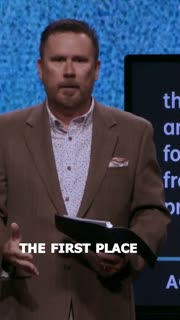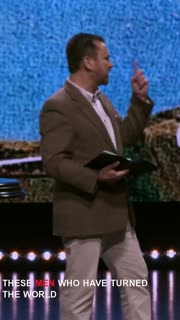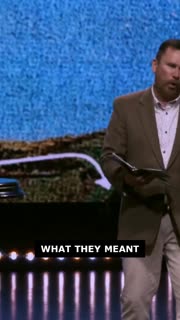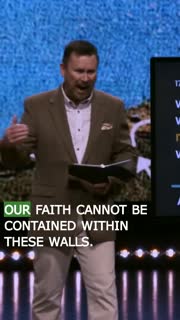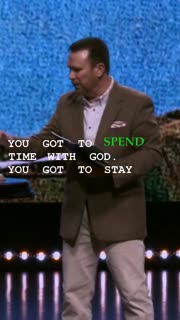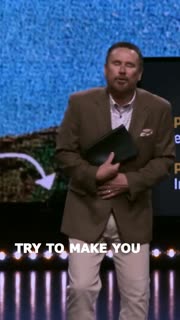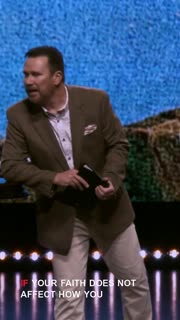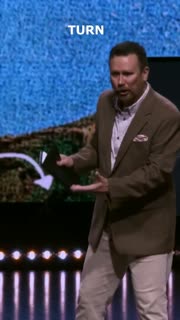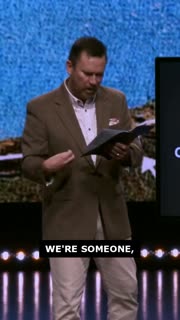Taking Jesus to the World: Paul's Missionary Example
Devotional
Sermon Summary
Bible Study Guide
Sermon Clips
1. "The first place Paul went in every town, he went to a local synagogue and connected. And don't just go to any church. Go to one that preaches Jesus. Go to one that preaches the scriptures. Go to one that says that Jesus suffered. And he rose from the dead. And that same power that lived in Jesus now lives in us. Hallelujah." [07:12] (25 seconds)
2. "These men who have turned the world upside down have come here too. And Jason, Jason has welcomed them. And they all acting contrary. It says they all acting contrary to Caesar's decrees saying that there's another King and his name is, come on every campus, shout it out. We got another King and his name is Jesus." [08:35] (24 seconds)
3. "There is another King. He's not a Democrat or Republican. His name's Jesus. And I want you to get that. You say, oh, okay, then how are we to live in this country where we have the blessed freedom of voting and electing our leaders? Here's what you do. You'd be a good Christian citizen, registered to vote. Voting started on the 20th here in this state, registered to vote, go vote. And then regardless of who wins, remember Jesus. Remember Jesus is Lord. Caesar is not Lord. That's going to help you. Remember Jesus is Lord." [09:49] (43 seconds)
4. "What they meant as derogatory and a complaint was really a compliment because that's what Jesus put the church here to do, to bring light where there's darkness, love where there's hatred. Uh, to, to bring a smile where there's a frown, to, to bring order and leadership where there's chaos. God put the church here so that we'll bring freedom where there's addiction, life where there's death. Why? Because we're taking Jesus to the world." [11:20] (30 seconds)
5. "Our faith cannot be contained within these walls. You can't keep Christianity at a campus or at a church. No, you don't hide a light under a bushel. You let your light shine. And we've got to go out there into the marketplace and take Jesus to the world. It means it's more. Everybody say more. It's more than one hour, one day of the week. It's more than one day out of a week. It's not just church. Oh, come on. You can do better than that. It's not just church. It's life. It's life." [12:35] (38 seconds)
6. "Daily, you got to spend time with God. You got to stay close to him. Daily, get in the word. Daily, go out into the world. And don't go out into the world until you spent time in the word. I'm preaching better than y'all responding. I'm just saying it's a daily thing." [13:21] (14 seconds)
7. "I don't need to try to make you a preacher. I don't need to try to make you a pastor. You just be who God made you to be. And you're going to reach people that I'll never reach. And I'm just telling you what you do in the kingdom is just as important and as much a calling as what I do in the kingdom. And everybody said, and so we want to have this coming." [18:25] (22 seconds)
8. "If your faith does not affect how you live on Monday, Tuesday, Wednesday, Thursday, Friday, Saturday, you don't have the real thing. I'm just being honest. No, he's Lord of all. He's Lord of all. And I think that the right answer is Christ transforms culture." [35:29] (15 seconds)
9. "Repentance says you turn from going in the wrong direction and you go in the right direction. And so the message that Paul said is, y'all need to come back home. Come back. Come back to God. And that's exactly what I'm preaching to you today. It doesn't matter how far you've gotten away in your thinking, in your living, it's time to come back home. Come back to the one who made you. Come back to the one who has a meaning and purpose for your life." [36:39] (27 seconds)
10. "Christianity really does answer the philosophical questions better than any other worldview. He articulated it like this. He said, because we are beings who have the power of choice, the cause that created us must have a will. We're someone, not a something, so the cause that created us must be a someone and not just a force. We're lovers made to love God and our neighbor. Why? Because God is love. And he made everything good and beautiful. And we were wired to discover our purpose, to go out there, to make a difference in the world. To do good." [37:14] (60 seconds)
Ask a question about this sermon
2. "These men who have turned the world upside down have come here too. And Jason, Jason has welcomed them. And they all acting contrary. It says they all acting contrary to Caesar's decrees saying that there's another King and his name is, come on every campus, shout it out. We got another King and his name is Jesus." [08:35] (24 seconds)
3. "There is another King. He's not a Democrat or Republican. His name's Jesus. And I want you to get that. You say, oh, okay, then how are we to live in this country where we have the blessed freedom of voting and electing our leaders? Here's what you do. You'd be a good Christian citizen, registered to vote. Voting started on the 20th here in this state, registered to vote, go vote. And then regardless of who wins, remember Jesus. Remember Jesus is Lord. Caesar is not Lord. That's going to help you. Remember Jesus is Lord." [09:49] (43 seconds)
4. "What they meant as derogatory and a complaint was really a compliment because that's what Jesus put the church here to do, to bring light where there's darkness, love where there's hatred. Uh, to, to bring a smile where there's a frown, to, to bring order and leadership where there's chaos. God put the church here so that we'll bring freedom where there's addiction, life where there's death. Why? Because we're taking Jesus to the world." [11:20] (30 seconds)
5. "Our faith cannot be contained within these walls. You can't keep Christianity at a campus or at a church. No, you don't hide a light under a bushel. You let your light shine. And we've got to go out there into the marketplace and take Jesus to the world. It means it's more. Everybody say more. It's more than one hour, one day of the week. It's more than one day out of a week. It's not just church. Oh, come on. You can do better than that. It's not just church. It's life. It's life." [12:35] (38 seconds)
6. "Daily, you got to spend time with God. You got to stay close to him. Daily, get in the word. Daily, go out into the world. And don't go out into the world until you spent time in the word. I'm preaching better than y'all responding. I'm just saying it's a daily thing." [13:21] (14 seconds)
7. "I don't need to try to make you a preacher. I don't need to try to make you a pastor. You just be who God made you to be. And you're going to reach people that I'll never reach. And I'm just telling you what you do in the kingdom is just as important and as much a calling as what I do in the kingdom. And everybody said, and so we want to have this coming." [18:25] (22 seconds)
8. "If your faith does not affect how you live on Monday, Tuesday, Wednesday, Thursday, Friday, Saturday, you don't have the real thing. I'm just being honest. No, he's Lord of all. He's Lord of all. And I think that the right answer is Christ transforms culture." [35:29] (15 seconds)
9. "Repentance says you turn from going in the wrong direction and you go in the right direction. And so the message that Paul said is, y'all need to come back home. Come back. Come back to God. And that's exactly what I'm preaching to you today. It doesn't matter how far you've gotten away in your thinking, in your living, it's time to come back home. Come back to the one who made you. Come back to the one who has a meaning and purpose for your life." [36:39] (27 seconds)
10. "Christianity really does answer the philosophical questions better than any other worldview. He articulated it like this. He said, because we are beings who have the power of choice, the cause that created us must have a will. We're someone, not a something, so the cause that created us must be a someone and not just a force. We're lovers made to love God and our neighbor. Why? Because God is love. And he made everything good and beautiful. And we were wired to discover our purpose, to go out there, to make a difference in the world. To do good." [37:14] (60 seconds)
